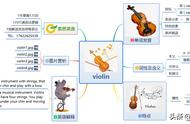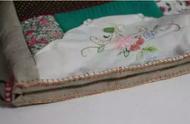
【重点单词】
guitar [ɡɪ'tɑ:(r)] n. 吉他
sing [sɪŋ] v. 唱;唱歌
swim [swɪm] v. & n. 游泳
dance [dɑːns], [dæns] v. 跳舞 n. 舞蹈
draw [drɔː] v. 画
chess [tʃes] n. 国际象棋
play chess 下国际象棋
speak [spiːk] v. 说(某种语言);说话
speak English 说英语
join [dʒɔɪn] v. 参加;加入
club [klʌb] n. 俱乐部;社团
be good at… 擅长于……
tell [tel ] v. 讲述;告诉
story ['stɔːrɪ] n. 故事;小说
write [raɪt] v. 写作;写字
show [ʃəʊ] n. 演出;节目 v. 给……看;展示;
or [ɔː(r)] conj. 或者;也不(用于否定句)
talk [tɔːk] v. & n. 说话;交谈
talk to … 跟……说
kungfu [,kʌŋ’fuː] n.(中国)功夫
drum [drʌm] n. 鼓
play the drums 敲鼓
piano [pɪ'ænəʊ] n. 钢琴
play the piano 弹钢琴
violin [,vaɪə'lɪn] n. 小提琴
play the violin 拉小提琴
also ['ɔːlsəʊ] adv. 也;而且
people ['piːpl] n. 人;人们
home [həʊm] n. 家;活动本部 adv. 到家;在家
be good with… 善于应付……的;对……有办法
make [meɪk] v. 使成为;制造
make friends 结交朋友
today [tə'deɪ] adv. 在今天
help (sb) with sth 在某方面帮助(某人)
center ['sentə(r)] n.(=centre)中心;中央
weekend [,wiːk'end], [ 'wiː kend] n. 周末
on the weekend (在)周末
teach [tiːtʃ ] v教;讲授
musician [mjuː'zɪʃn] n. 音乐家
【重点短语】
1. play the guitar 弹吉他
2. play chess 下棋
3. speak English 说英语
3. what to do sth 想做某事
4. join the music club 加入音乐俱乐部
5. match…..with 与……匹配
6. the swimming club 游泳俱乐部
7. what club 什么俱乐部
8. a sports club 一个体育俱乐部
10. be good at telling stories 擅长讲故事
11. the story telling club 讲故事俱乐部
12. like to do/doing sth 喜欢做某事
13. let’s join 让我们加入......
14. sound good 听起来不错
15. students wanted for School Show 学校表演招聘学生
16. talk to/with sb 跟某人谈话
17. after school 放学后
18. do kung fu 表演功夫;练功夫
19. show sb. sth.=show sth. to sb. 把某物展示给某人
20. play games with people 和人们做游戏
21.be in the school music club 在学校音乐俱乐部
22. help for old people 对老人的帮助
23. be good with… 和某人相处得好,善于和..打交道
24. be free / be busy 空闲的/忙的
25. in July 在六月份
26. tell sb. stories 给某人讲故事
27. make friends with… 和某人交朋友
28. call sb. at …… 给某人打电话……
29. on the weekend 在周末
30. help sb.(to) do sth. 帮助某人做某事
31. help sb. with sth. 在某方面帮助某人
32. English-speaking students 说英语的学生
33. It is adj (for sb) to sth. 做某事(对于某人来说)是…..
34. play the piano 弹钢琴
35. play the violin 拉小提琴
36. the Students’ Sports Center 学生运动中心
37. need help to teach music 需要帮助来做某事
38. need sb. to do sth 需要某人做某事
39. teach sb. to do sth 教某人做某事
40. be in our school music festival 参加我们学校的音乐节
【用法集萃】
1. play 棋类/球类 下…棋/打…球
2. play the 西洋乐器 弹/拉…乐器
3. be good at doing sth.= do well in doing sth. 擅长做某事
4. be good with sb. 和某人相处地好
5. need sb. to do sth. 需要某人做某事
6. can 动词原形 能/会做某事
7. a little 不可数名词 一点儿…
8. join the…club 加入…俱乐部
9. like to do sth. =love to do sth. 喜欢/喜爱做某事
【重点句型】
1. —Can you swim?
你会游泳吗?
—No,I can’t.
不,我不会。
2. Can you play the guitar?
你会弹吉他吗?
3. I want to join the art club.
我想参加艺术俱乐部.
4. What club do you want to join?
你想参加什么俱乐部?
5. You are very good at telling stories.
你非常擅长讲故事。
6. Sounds good. But I like to draw,too.
听起来不错。但我也喜欢画画。
7. Then join two clubs—the story telling club and the art club!
那么就请加人两个俱乐部—— 讲故事俱乐部和艺术俱乐部。
8. 一Can Wu Jun speak English?
吴俊会讲英语吗?
一No,he can’t, but he can speak Chinese.
不会,但他会讲汉语。
9. Are you good with old people?
你与老人们相处得融洽吗?
10. Can you play the piano or the violin?
你会弹钢琴还是会拉小提琴?
初中生i学习sszzb_czb
【话题写作】
主题:介绍自己特长/强项
Dear Sir,
I want to join your organization (组织) to help kids with
sports, music and English.
My name is Mike. I am 15 years old. I'm a student in No. 1 Middle school. I can play the guitar well. I can sing many songs. I can swim and speak English well, too. I think I can be good with the kids. I also do well in telling stories.
I hope to get your letter soon.
Yours,
Mike
Unit2 What time do you go to school?【重点单词】
up [ʌp] adv. 向上
get up 起床;站起
dress [dres] v. 穿衣服 n. 连衣裙
get dressed 穿上衣服
brush [brʌʃ] v. 刷 n.刷子
tooth [tuːθ] n. (pl. teeth [tiːθ] ) 牙齿
shower ['ʃaʊə] n. & v. 淋浴 n. 淋浴器(间)
take a shower 洗淋浴
usually ['ju:ʒuəli] adv. 通常地;一般地
forty ['fɔ:(r)ti] num. 四十
wow [waʊ] interj.(表示惊奇或敬佩)哇;呀
never ['nevə(r)] adv. 从不;绝不
early ['ɜːlɪ] adv. & adj. 早(的)
fifty ['fɪftɪ] num. 五十
job [dʒɒb], [dʒɑːb] n.工作;职业
work [wɜːk] v. & n. 工作
station ['steɪʃn] n. 电(视)台;车站
radio station 广播电台
o'clock [ə'klɒk], [ə'klɑ:k] adv.(表示整点)……点钟
night [naɪt] n. 晚上;夜晚
funny ['fʌnɪ] adj. 奇怪的;滑稽好笑的
exercise ['eksəsaɪz] v. & n. 锻炼;练习
on weekends (在)周末
best [best] adj. 最好的 adv. 最好地;最
group [gruːp] n. 组;群
half [hɑːf], [hæf] n. & pron. 一半;半数
past [pɑːst], [pæst] prep. 晚于;过(时间)adj. 过去的
quarter ['kwɔː(r)tə(r)] n.一刻钟;四分之一
homework ['həʊmwɜː(r)k] n. 家庭作业
do (one’s) homework 做作业
run [rʌn] v. 跑;奔
clean [kliːn] v. 打扫;弄干净 adj. 干净的
walk [wɔːk] n. & v. 行走;步行
take a walk 散步;走一走
quickly ['kwɪkli] adv. 很快地
either ['aɪðə(r)], ['iː ðə(r) ]adv. 或者;也(用在否定词组后)
either…or … 要么……要么……;或者……或者……
lot [lɒt], [lɑ:t] pron. 大量;许多
lots of 大量;许多
sometimes ['sʌmtaɪmz] adv. 有时
taste [teɪst] v. 有……的味道;品尝 n.味道;滋味
life [laɪf] n. 生活;生命
【重点短语】
1. go to school 去上学
2. get up 起床
3. get dressed 穿衣服
4. brush teeth 刷牙
5. eat breakfast 吃早饭
6. take a shower 洗澡
7. what time 什么时间
8. at six forty 在六点四十
9. an interesting job 一个有趣的工作
10. at the radio station 在广播电视台
11. usually /always/ often/ sometimes/ never 经常/总是/经常 /有时/从不
12. your radio show 你的广播节目
13. from …..to 从….到…..
14. at night 在夜晚
15. a funny time 一个有趣的时间
16. take exercise 锻炼
17. be late for….. 因… 迟到
18. at about ten twenty 在大约十点二十
19. on weekends 在周末
20. on school days 在上学日
21. half past six 六点半
22. a quarter past three 三点过一刻 (3:15)
23. a quarter to ten 十点差一刻 (9:45)
24. do (one’s) homework 做(某人的)家庭作业
25. take a walk 散步
26. go to bed 睡觉
27. eat quickly 吃得快
28. have much time 有许多时间
29. half an hour 半个小时
30. get home 到达家
31. either…..or 或者…….或者......
32. eat a good breakfast 好好吃顿早餐
33. lots of = a lot of 许多
34. be good for….. 对…….有益
35. taste good 尝起来好
36. do her homework 做她的家庭作业
37. have a healthy life 有一个健康的生活方 式
38. have dinner 吃晚饭
【用法集萃】
1. at 具体时间点 在几点(几分)
2. eat breakfast/lunch/dinner 吃早饭/午饭/晚饭
3. thirty/half past 基数词 …点半
4. fifteen/a quarter to 基数词 差一刻到…点
5. take a/an 名词 从事…活动
6. from…to… 从…到…
7. need to do sth 需要做某事
【重点句型】
1. What time do you go to school?
你几点去上学?
2. 一What time do you usually take a shower,Kick?
瑞克,你通常几点钟淋浴?
—I usually take a shower at six forty.
我通常六点四十淋浴。
3. 一When do you go to work?
你什么时候去上班?
一At eleven o’clock, so I’m never late for work.
十一点,我上班从来没有迟到过
4. —What time do they get dressed?
他们几点钟穿上衣服?
一They always get dressed at seven twenty.
他们总是七点二十穿上衣服。
5. What time does your best friend go to school?
你最好的朋友几点去上学?
6. —When do students usually eat dinner?
学生们通常几点钟吃正養?
一They usually eat dinner at a quarter to seven in the evening.
他们通常晚上六点四十五吃正餐。
7. When I get home. I always do my homework first.
我到家后,总是先做家庭作业。
8. In the evening,I either watch TV or play computer games.
晚上,我要么看看电视,要么玩玩游戏。
【话题写作】
主题:谈论日常作息习惯
My School Day
I am a student. I usually get up at seven, and I eat breakfast at seven thirty. Then I go to school at eight. School starts at eight thirty. I eat lunch at twelve. I go home at 17:00. I often eat dinner at 19:00 and then play the piano. I do my homework at 20:00. At 22:00, I go to bed.
Unit3 How do you get to school?【重点单词】
train [treɪn] n. 火车
bus [bʌs] n. 公共汽车;公交车
subway ['sʌbweɪ] n. 地铁
take the subway 乘地铁
ride [raɪd] v. 骑 n. 旅程
bike [baɪ k] n. 自行车
ride a bike 骑自行车
sixty ['sɪkstɪ] num. 六十
seventy ['sevntɪ] num. 七十
eighty ['eɪtɪ] num. 八十
ninety ['naɪntɪ] num. 九十
hundred ['hʌndrəd] num. 一百
minute ['mɪnɪt] n. 分钟
far adv.&adj远;远的
kilometer n.公里
new adj.新的;刚出现的
every adj.每一;每个
every day 每天
by prep.(表示方式)乘(交通工具)
by bike 骑自行车
drive v.开车
car n.小汽车;轿车
live v.居住;生活
stop n.车站;停止
think of 认为
cross v.横过;越过
river n.河;江
many adj.&pron.许多
village n.村庄;村镇
between prep.介于…之间
between…and… 在……和……之间
bridge n.桥
boat n.小船
Ropeway n.索道
year n.年;岁
afraid adj.害怕;惧怕
like prep.像;怎么样
leave v.离开
dream n.梦想;睡梦 v.做梦
true adj.真的;符合事实的
come true 实现;成为现实
【重点短语】
1. get to school 到达学校
2. take the train 乘火车
3. take the subway 乘地铁
4. ride a bike 骑自行车
5. how do you get to school 怎么到达学校
6. one hundred and five 105
7. how far 多远
8. how long 多长时间
9. it takes sb some time to do sth 它花费某人多长时间做某事
10. ride the bike to school 骑自行车到学校
11. walk to , drive to ,fly to… 步行去…;开车去…;坐飞机去….
12. every day 每天
13. I’m not sure 我不敢确信
14. about= around 大约
15. 10 kilometers 十公里
16. good exercise 好的锻炼
17. drive his car to work 开车去上班
18. in his father’s car 坐父亲的车
19. need about 10 minutes to get to school 需要十分钟的时间到达学校
20. what do you think of…=how do you like… 你觉得怎么样
21. cross the river 过河
22. It is easy to get to school. 到达学校很容易。
23. there is 有
24. between…and… 在两者之间
25. no= not any / not a 没有
26. The river runs quickly. 河水流得快。
27.quickly 动作上快 fast 速度上快 soon时间上快
28. on a ropeway 在索道上
29. go on a ropeway to cross the river 坐索道穿过河
30. love to do 喜欢做某事
31. an 11-year-old boy一个11岁大的男孩
32. ten minutes’ walk / a ten-minute walk 10分钟的路
33. be like a father to me 像父亲一样做某事
34. leave for … 到某地
35. be afraid to do, be afraid of sth / doing…害怕做某事
36. come true 实现
37. thanks for n /doing sth.为…而感谢
38. at about 8:00 在大约8点
39. How to do it? 怎么来做它?
【用法集萃】
1. take…to…= go to…by… 乘…去…
2. How do/does sb get to…? 某人是怎样到…的?
3. How far is it from…to…? 从…到…有多远?
4. It takes sb. some time to do sth. 做某事花费某人多长时间。 5. How long does it take to do sth.? …花费多长时间?
6. It is adj. to do sth. 做某事是…
7. Thanks for n./Ving 感谢你(做)某事。
【重点句型】
1. —Hey, Dave, How do you get to school?
喂,戴夫,你是如何到校的?
—I walk. How about you, Sally?
我是步行到校的,萨丽,你呢?
—I ride my bike.
我是骑自行车到校的。
2.—I ride it to school every day. How do you get to school?
我每天骑自行车上学,你呢?
一I usually take the bus.
我通常乘公交车上学.
3. How far is it from your home to school?
从你家到学校有多远?
4. 一How long does it take you to get to school?
你到学校要用多长时间?
—About 15 minutes by bike.
骑自行车大约十五分钟。
5. —Well, have a good day at school.
祝你在学校度过愉快的一天。
—You, too.
你也是。
6. —How do you get to school?
你是如何到校的?
—Well, I ride my bike to the subway station. Then I take the subway.
我先骑车去地铁站,然后乘地铁去学校。
7. Do you walk or ride a bike?
你是步行还是骑自行车?
8. For many students, it is easy to get to school.
对于许多学生来讲,上学是挺方便的。
9. There is a very big river between their school and the village.
在他们的学校与村庄之间有一条大河。
10. There is no bridge and the river runs the quickly for boats.
(河上)完全没有桥梁,而且河水湍急,不宜小船摆渡。
【话题写作】
主题:上学的交通方式
写作思路:②开篇点题:点出自己的出行方式;②具体内容:自己选择这种交通方式的原因;③结束语: 表明自己的观点。
The Best Way for Me to Go to School
Different students go to school in different ways in our school, but I llike to go to school on foot.
First, I live near the school, so my home is not far from my school. And it takes me a few minutes to get there. Second, there is a crossing on my way to school, and sometimes the traffic is very busy. I think it is safer to go to school on foot. Third, I think walking is good for my health. It’s a kind of sport and it makes me study better.
So in my opinion, the best way to go to school is on foot. What about you?
Unit4 Don’t eat in class.【重点单词】
rule n.规则;规章
arrive v.到达
(be) on time 准时
hallway n.走廊;过道
hall n.大厅;礼堂
dining hall 餐厅
listen v.听;倾听
listen to… 听……
fight v. &n.打架;战斗
sorry adj.抱歉的;难过的;惋惜的
outside adv在外面adj 外面的
wear v.穿;戴
important adj.重要的
bring v.带来;取来
uniform n.校服;制服
quiet adj安静的
out adv.外出
go out 外出(娱乐)
practice v.& n.练习
dish n.碟;盘
do the dishes 清洗餐具
before prep. conj在… 以前 adv以前
make (one’s) bed 铺床
dirty adj.脏的
kitchen n.厨房
more adj. pron.更多的
noisy adj.吵闹的
relax v.放松;休息
read v.读;阅读
terrible adj.非常讨厌的;可怕的
feel v.感受;觉的
strict adj.严格的;严厉的
be strict (with sb) (对某人)要求严格
remember v.记住;记起
follow v.遵循;跟随
follow the rules 遵守规则
luck n.幸运;运气
keep v.保持;保留
hair n.头发;毛发
learn v. 学习;学会
初中生i学习sszzb_czb
【重点短语】
1. Don’t eat in class 在课堂上
2. arrive late for class 上课迟到
3. be on time 准时
4.in the hallways 在走廊里
5.in the dining hall 在餐厅
6. listen to music 听音乐
7 fight with… 与某人打架
8.Don’t eat in class. 不要在课堂上吃东西。
9. listen to music outside 在外面听音乐
10. wear a hat 戴帽子
11. There are a lot of rules. 有许多规则。
12. be late for … 因…而迟到
13. bring sth to … 带...到...
17. wear school uniform 穿校服
18. have to be quiet 不得不安静
19. see friends 看朋友
20. practice the guitar 练习吉他
21. do the dishes 洗盘子
22. help his mom make breakfast 帮助妈妈做早饭
23. clean his room 打扫他的房间
24. before dinner 晚饭后
25. too many rules太多规则
too many 可数名词 太多…
too much 不可数名词 太多…
much too 形容词 太…
26. make your bed 整理床铺
27. after breakfast 早饭后
28. leave sth in 地点 留….在某处
29. be noisy 太闹/ be quiet安静的
30. How you feel? 你感觉怎么样。
31. feel well 感觉好
32. tell sb. to do sth 告诉(叫)某人做某事
33. think about it 考虑它;想一下
34. on weekends 在周末
35. be strict with sb. 对某人严格要求
be strict in sth. 对某事要求严格
38. remember to do sth. 记住做某事
39. make rules to help us 制定规则做某事
40. follow the rules 遵守规则
41 keep my hair short 保持头发短
42 play with my friends
43. either 也(用于否定句末)
44. have fun doing 做某事有趣
【用法集萃】
1. Don’t 动词原形 其他。 不要做某事。
2. help sb. (to) do sth. 帮助某人做某事
3. too many 可数名词复数 太多的……
4. practice doing sth. 练习做某事
5. be strict with sb. 对某人要求严格
6. be strict in sth. 对某事要求严格
7. leave sth sp. 把某物落在某地
8. keep 宾语 形容词 使……保持某种状态
9. learn to do sth. 学会做某事
10. have to do sth. 不得不做某事
【重点句型】
1. Don't eat in class.
在课堂上不准吃东西。
2. Don't arrive late for class, you must be on time.
不准上课迟到,务必守时。
3. Don’t run is the hallways.
不准在走廊内乱跑。
4. Don’t eat in the classroom. You must in the dining hall.
不准在教室里吃东西,务必在餐厅里吃东西。
5. Don’t listen to music-in class.
不准在课堂上听音乐。
6. —Can we listen to music, Cindy?
我们可以听音乐吗?
—We can’t listen to music in the hallways, but we can listen to it outside.
我们不可以在走廊里听音乐,但在外面可以听。
7.—Can we bring music players to school?
我们可以把音乐播放器带到学校吗?
一No,we can't. And we always have to wear the school uniform.
不行,而且我们总是要穿着校服。
8. 一Does he have to wear a uniform at school?
他在学校一定要穿校服吗?
—Yes, he does. /No, he doesn't.
是 的 ,必须要穿校服。/不,不必要穿校服。
9. Get up now and make your bed.
现在起床了,把床铺整理一下。
10. Don’t leave the dirty dishes in the kitchen!
别把脏碗留在厨房里!
【话题写作】
主题:规则
Dear Tom,
Thanks for your last letter. You want to know the rules in our school. Now let me tell you about them.
We can’t arrive late for class. We can’t talk loudly in class. We should keep quiet. When we meet our teachers on our way, we should say hello to them. We can’t eat or drink in class, and we can’t listen to music or play games in class.
I think we have too many rules. What about yours? Please write and tell me.
Yours,
Li Ming
Unit5 Why do you like pandas?【重点单词】
panda n. 熊猫
zoo n. 动物园
tiger n. 老虎
elephant n.大象
koala n. 树袋熊
lion n. 狮子
giraffe n. 长颈鹿
animal n .动物
cute adj. 可爱的;机灵的
lazy adj. 懒散的;懒惰的
smart adj. 聪明的
beautiful adj 美丽的;美好的
scary adj. 吓人的;恐怖的
kind n. 种类
kind of 稍微;有点儿
Australia n. 澳大利亚
south adj. 南方的 n. 南;南方
Africa n.非洲
South Africa 南非
pet n. 宠物
leg n. 腿
cat n. 猫
sleep n. 睡觉
friendly adj .友好的
shy adj. 羞怯的;腼腆的
save v. 救;救助
symbol n. 象征
flag n. 旗;旗帜
forget v. 忘记;遗忘
get lost 迷路
place n. 地点;位置
water n.水
danger n. 危险
be in (great) danger 处于(极大)危险之中
cut v. 砍;切
down adv.(坐、躺、倒)下 prep.向下;沿着
cut down 砍倒
tree n. 树
kill v.*死;弄死
ivory n.象牙
over prep .超过;多于;在… 上方
(be) made of 由……制成的
Thailand n.泰国
Thai n.泰国(人的);泰语(的)
【重点短语】
1. importance in Thailand 在泰国的重要性
2. Let’s see…. first. 让我们先看...
3. favorite animals 最喜欢的动物
4. kind of interesting 有点有趣
5. South Africa 南非
6. be from =come from 来自
7. be smart 聪明的
8. walk on two legs 用两条腿走
9. all day/all night 整天 /整夜
10. a good name for her 对于她是个好名字
11. like …a lot 非常喜欢......
12. black and white 黑白相间
13. You’re right. 你是正确的。
14. one of 名词复数 (......其中之一)
15. our first flag 我们的第一面旗
16. a symbol of good luck 好运的象征
17. draw well 画得好
18. forget to do 忘记做某事
19. get/be lost 迷路
20. places with food and water有食物和水的地方
21. be in great danger 处于危险
22. cut down 砍倒
23. over = more than 超过/多于
24 be made of... 由…制成
25.Thai Elephant Day 大象节
【用法集萃】
1. —Why…? 为什么……?
—Because… 因为……
2. let sb. do sth. 让某人做某事
3. want to do sth. 想要做某事
4. one of 名词复数 ……之一
5. forget to do sth. 忘记要做某事
6. forget doing sth. 忘记做过某事
7. help sb. (to) do sth. 帮助某人做某事
8. be friendly to sb. 对某人友好
【重点句型】
1. —Let's see the pandas first. They're my favorite animals.
咱们先看熊猫吧,我最喜欢熊猫了。
—Why?
为什么?
—Because they’re very cute.
因为它们非常可爱。
2. Why do you want to see them?
你为什么想看它们?
3. He can walk on two legs.
他(指“狗”)会立着行.
4. —Why don’t you like the cat?
你为什么不喜欢这猫?
—Well,because she's kind of boring, she sleeps all day.
因为她有点儿令人乏味,并且整天都在睡觉
5. —Why don't you like tigers?
你为何不喜欢老虎?
—Because they're really scary.
因为它们确实可怕。
6. —Where are lions from?
狮子来自什么地方?
—They're from South Africa.
他们来自南非。
7. But I like tigers a lot.
但我非常喜欢老虎。
8. Our first flag had a white elephant on it.
我们的第一面国旗上就绘着一头白象!
9. People say that “an elephant never forgets. ”
人们说大象从来不会忘记。
10. Elephants can walk for a long time and never get lost.
大象能够长时间行走,而且不迷路。
11. But elephants are in great danger.
但是大象面临巨大的危险。
12. We must save the trees and not buy things made of ivory.
我们必须拯救树木,拒买象牙制品。
【话题写作】
主题:介绍自己喜欢的动物
The Animal I Like
There are many kinds of animals in the world. What animal do I like? Let’s know her.
Many people like her very much. I also like her. She is from China. She is very cute. She doesn’t eat grass and meat at all. She eats bamboo every day. She is so nice. She is black and white. She has two big black ears and eyes. And she also has black legs and arms.
What animal is she? She is a panda. I like panda very much. Do you like her? What animal do you like?




























